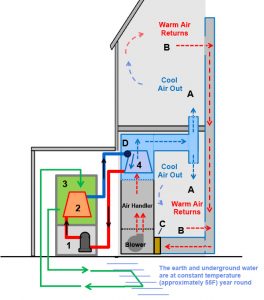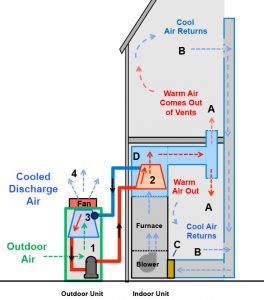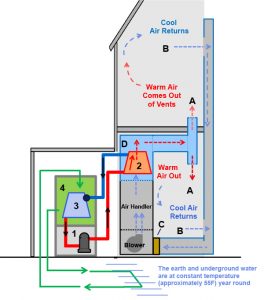Originally published on November 12, 2012
Understanding AC Systems: A Behind-the-Scenes Look
While most people associate air conditioning with cold, the science behind making your home cooler actually deals with the transfer of heat. When that heat is lost, or removed, the remaining cold air cools your home. In order to understand this system better, let’s look at the major components. Your central air conditioning system has two key components: the indoor unit, and the outdoor unit. They work in tandem to keep your home comfortable year-round.
Indoor Unit
The indoor unit is typically located in a closet or basement, and is near where your furnace filter is located. The unit consists of a coil box that contains what is called an evaporator. The evaporator allows for the refrigerant – a cooling fluid inside the coil piping sometimes known by a brand name such as Freon™ – to evaporate and absorb heat. Once the heat is absorbed from inside your home, it leaves nothing but cool air to be sent back into your home.
Just as water absorbs heat from your stove in order to boil (or evaporate) refrigerant absorbs heat from your house. This means that both water and refrigerant turn from liquid to vapor as they absorb heat.
Outdoor Unit
The outdoor unit is usually located in the rear or side of your house and it is where the heat from inside your home is dispersed. It contains the compressor, condenser coil and a fan. The heat absorbed from your home’s air is transferred to the refrigerant and then pumped to the outdoor unit. As this heat is absorbed and moved by the refrigerant to the outdoor coil, it passes through the compressor.
The compressor in your air conditioning system has the primary job of moving the refrigerant throughout the system. This is important as we can then keep reusing the refrigerant to cool our house. The refrigerant is compressed to a higher pressure, and moved through the outdoor coil known as the condenser. As the refrigerant passes through the condenser, a fan delivers ambient air across the condenser coil causing it to cool.
As the process completes, the heat from inside your house is dispersed to the air outside your house. The refrigerant is then pumped back indoors and the whole process repeats.
Did you know that making your home cooler was actually less about increasing cold air and more about removing existing heat?
Related Articles
Simple Ways to Extend the Life of Your AC and Heating System





